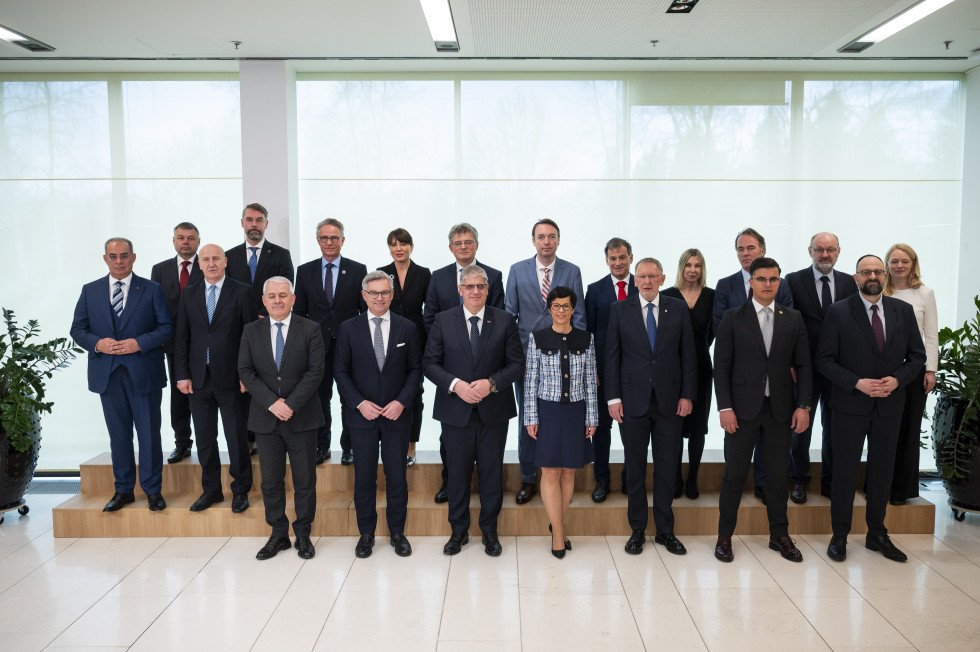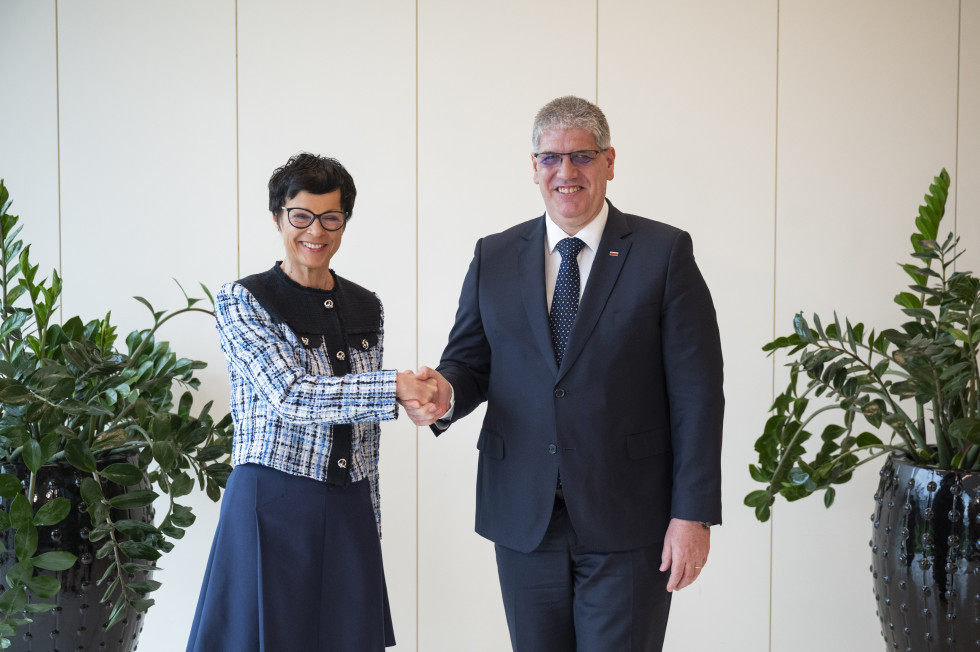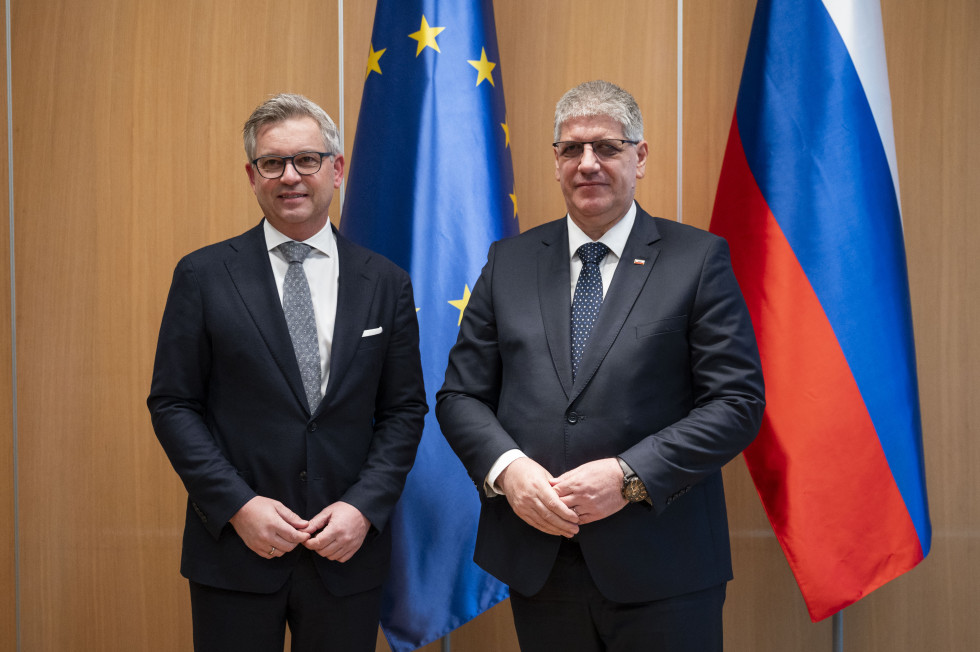Brdo Process: Ministers of the Interior adopt a declaration on strengthening cooperation in the fight against terrorism and trafficking in human beings
In a joint declaration, the Ministers of the Interior and representatives of the Brdo Process countries expressed support for enhancing regional cooperation in the fight against terrorist threats and emphasized the crucial role of the Network of National Anti-Trafficking Coordinators of South-East Europe (NATC SEE) in the fight against irregular migration. They called for united, coordinated and decisive action.
The meeting began with a minute of silence to honour the victims of the tragic incident in Kocani, North Macedonia. The first agenda item focused on ensuring security and enhancing (regional) cooperation in a rapidly evolving security environment, particularly in response to emerging terrorist threats.
"Slovenia is committed to the idea of the European Union; we share the common values of the European Union – solidarity, inclusion, common solutions. This is what makes us strong and resilient. This is also a time when the security – of not only Slovenia, but of the entire European Union –, is of paramount importance," said Minister Poklukar after the meeting. The security environment has changed. "I am talking about a new security reality. This makes our united and common action all the more important. These European values were also the focus of today's first ministerial debate of the Brdo Process," the Minister underlined.
The ministers agreed that terrorism remains a significant threat to internal security in the region. Therefore, according to Minister Poklukar, it must be addressed in a strategic, coordinated and effective manner. This can only be done through immediate exchange of quality information on the situation in the region. The ministers also agreed on the need for continuous and rapid adaptation by law enforcement authorities to perceived changes in the criminal environment and contemporary security challenges. However, the worrying trend of online radicalisation, which is being observed across all countries, should not be overlooked. Minister Poklukar said that this period signifies the need for changes to the national security system. Terrorism is one of the most immediate threats, which is why bringing together all stakeholders from this field is of the utmost importance.
The importance of external border security and effective migration management is continuously part of the agenda of meetings like the Brdo Process, as terrorist groups often use migration flows to infiltrate their members. "Enhanced control of the region's external borders, cooperation with the Western Balkan countries and coordinated action are key steps in our common strategy," stressed Minister Poklukar. He added that strengthening border security is not only a matter of surveillance, but also involves developing advanced identification methods, the use of biometrics and improved coordination with agencies such as Frontex and Europol.
According to Minister Poklukar, it is important that the measures discussed at the conference be effectively translated into practice through enhanced cooperation. No country, including Slovenia, can tackle global threats such as terrorism on its own. The key lies in uniting efforts and delivering a collective response.
The second part of the ministerial meeting was dedicated to a discussion on the role of the Network of Anti-Trafficking Coordinators of South-East Europe and the challenges of addressing trafficking in human beings within mixed migration flows. Victims of trafficking in human beings are recognized under the Common European Asylum System as a particularly vulnerable group, requiring special attention throughout the asylum and reception process. The EU Asylum Agency's Executive Director, Nina Gregori, shared the agency's experiences and good practices.
Ministers also took note of the new Network Strategy Paper for the 2025–2029 period, which was adopted by the Anti-Trafficking Coordinators at their meeting on 27 March 2025. This new strategy is more ambitious than the previous one and focuses on strengthening strategic and operational cooperation in the region, also in areas such as joint preventive awareness-raising actions, joint field controls and joint handling of cross-border cases. "The fight against trafficking in human beings is an extremely important task of the Ministry of the Interior and the Police, because these are incredibly tragic stories involving vulnerable groups of people, such as children and women," Minister Poklukar stressed.

Family photo | Author Boštjan Podlogar, STA
Background
The Brdo Process is a well-established platform where, since 2001, the challenges in the Western Balkans region have been addressed through joint efforts and dialogue.
The 13th meeting of the Brdo Process was also attended by the Minister of the Interior of Croatia, Dr Davor Bozinović, the Minister of the Interior of Montenegro, Danilo Šaranović, and the Minister of the Interior of Kosovo, Xhelal Sveçla, as well as by representatives of the Ministries of the Interior of Austria, Italy, Hungary, Albania, Bosnia and Herzegovina, North Macedonia and Serbia. Among other attendees were the Executive Director of the EU Asylum Agency, Nina Gregori, the EU Counter-Terrorism Coordinator, Bartjan Wegter, the EU Anti-Trafficking Coordinator, Diane Schmitt, and representatives of Europol, Frontex and the International Centre for Migration Policy Development (ICMPD).

European Commissioner Marta Kos and Minister of the Interior Boštjan Poklukar | Author Boštjan Podlogar, STA
Bilateral meetings
On the margins of the ministerial meeting, Minister Boštjan Poklukar met with the European Commissioner for Internal Affairs and Migration, Magnus Brunner. They discussed topical issues in the field of home affairs at the EU level.
Minister Poklukar said that Slovenia was actively working on the implementation of the Pact on Migration and Asylum and was giving priority to this task. Minister Poklukar also pointed to the proposal for an EU Return Regulation regarding the return of migrants who have no right to stay in the European Union as one of the key amendments to the Pact. Minister Poklukar called on the EU to make this legislation a priority. The Proposal for a Common European System for Returns introduces the possibility of establishing return hubs in third countries. While this option is still under review, any agreement with a third country must ensure full respect for international human rights standards and principles of international law, including the principle of non-refoulement, and give due consideration to vulnerable groups.
Minister Poklukar also stressed the importance of the effective functioning of the Schengen area. As we approach the 40th anniversary of the Schengen Agreement, a thorough reflection at the level of the EU on the future of Schengen is needed. Slovenia remains a strong supporter of the Schengen area, and it is crucial that all EU Member States remain committed to preserving it. Due to the increased terrorist threat in the EU and the rise of organised crime in the Western Balkans region, Slovenia had to make the difficult decision to temporarily reintroduce controls at its internal borders with Hungary and Croatia. Since the reintroduction of border controls at the end of October 2023, Slovenia has significantly stepped up operational police cooperation and political talks with its neighbouring countries. These controls will be lifted as soon as the conditions permit. Minister Poklukar and Commissioner Brunner agreed that the work of Frontex is also crucial in combating irregular migration in the Western Balkans region. Minister Poklukar emphasised the importance of signing a status agreement between Bosnia and Herzegovina and Frontex as soon as possible, and advocated for an expanded mandate for the agency, which should play a greater role in return operations across the region. Minister Poklukar also called on the Commission to step up its efforts to harmonise visa regimes in the Western Balkan countries with those of the EU.
In a brief bilateral meeting, the Ministers of the Interior of Slovenia and Montenegro reaffirmed the good relations between the two countries in the field of home affairs.

European Commissioner for Internal Affairs and Migration Magnus Brunner and Minister of the Interior Boštjan Poklukar | Author Boštjan Podlogar, STA

